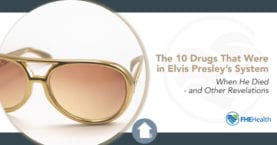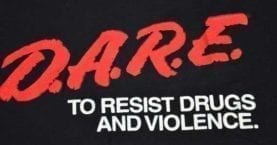What constitutes a performance-enhancing drug? That question continues to spark vigorous debate. The off-label use of beta blockers in recent years is one example. These drugs have made their way into many arenas where people must perform or compete: Athletes use beta blockers to reduce anxiety and steady their ... Read More
The Experience Blog
FHE Health is comprised of a team of professionals dedicated to improving our patients well-being. In this section our experience is used to weigh in on current events including legislation and trends as well as expert opinion articles directly contributed by our staff. The proof of our program is our Alumni, so we often feature articles from those who have completed our program. They offer real-life stories of struggle, hope and a new life. In our blog you’ll also find out about upcoming events and community impact efforts FHE Health is taking part in.
Performance-Enhancing Beta Blockers: An Expert Opinion
The 10 Drugs That Were in Elvis Presley’s System When He Overdosed – and Other Revelations
It has been over 40 years since Elvis Presley's death in 1977, but in many ways, his legend lives on. Elvis was a musical and cultural icon who will never truly die, from a societal standpoint, and his influence is not easily forgotten. While Elvis is best known for his musical and acting performances, there is much ... Read More
Where Are They Today? A Series on Past Hope for Healing Winners
In March 2020, Isabel Buckingham and Melanie Ryerson became the first-ever recipients of “FHE Health’s Hope for Healing Scholarship.” Now in its fifth year, our annual $5000 scholarship recognizes two outstanding students in the field of behavioral health, one undergraduate and one graduate student. Where are ... Read More
Married? Mental Health and Life Expectancy After “I Do”
There's a common belief that married people live longer and are generally happier than their single counterparts. While research suggests married people may have longer life spans, actual results vary, and some of the benefits may also apply to cohabitating couples. The connections between getting married, mental ... Read More
“Just Say No” and the D.A.R.E Program
In 1982, First Lady Nancy Reagan uttered the three words “just say no,” to a schoolgirl who had asked what she should say if someone offered her drugs. The first lady’s suggestion, as we all know, became the unified call for the adolescent drug prevention movement we have all come to know and may have experienced. ... Read More
Oral and Mental Health: What’s the Connection?
Studies have proven there exists a strong oral health-mental connection, often referred to as the mouth/body connection. This connection suggests that oral health isn't separate from the rest of the body but instead links to multiple mental and physical processes. Signs such as a painful smile and periodontal disease ... Read More
Women, Perfectionism and Social Media – An Interview with Chief Clinical Officer Dr. Beau Nelson
When FHE Health Chief Clinical Officer Dr. Beau Nelson talks about women, perfectionism and social media, it quickly becomes apparent that he knows a thing or two about the topic, having dealt with it firsthand. Dr. Nelson has experience in the area of treating body image issues and eating disorders— conditions that ... Read More
2024 Hope for Healing Graduate Recipient: A Refugee of War and Therapist
Each year FHE Health awards two outstanding individuals, one an undergraduate and one a graduate student, with a $5000 scholarship to help further their education in the field of addiction, mental/behavioral health and/or psychiatry. In this second of two blogs spotlighting this year’s winners, you’ll meet Dona Nguyen, ... Read More

















